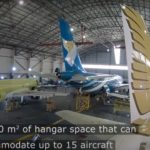Skyborne Airline Academy’s CEO and COO explain how the company has to made a speedy switch to remote learning modules following the coronavirus outbreak.
The Academy offers pilot training at its dedicated facilities in Gloucestershire, Castellon Airport in Spain and Arizona.
CEO Lee Woodward explained how the academy switched from the practical training to a virtual system within a week and gained CAA approval within 24 hours. “Simply put, the training of pilots breaks down really into two components. You’ve got practical training in the aeroplane and simulator and you’ve got ground based classroom-based training. Due to the social distancing requirements, we couldn’t train in the aircraft and simulator however, we could continue to train the theory in the classroom if we use a virtual system, and that’s what we did.”
Virtual course was adapted for cadets within one week
Chief Operating Officer Ian Cooper explained how the course was structured and how Skyborne achieved CAA approval within a week. He said: “For the regulatory part of it, you have to do 750 hours of classroom based tuition for ATPL subjects. So we basically replace that by doing remote learning through a virtual airline training platform.”
“The way that works is you have one hour classes, but they’re broken down into 20 minute sessions, because we found that the pace is a lot faster than the instructor classroom-based session. The reason for that is you don’t have the body language feedback you’d normally get in a classroom-based situation.”
Package was approved by CAA in 24 hours
The course timeline was adapted to meet the realities of online learning, as well as the formulation of one to one work groups. At the end of the day, individuals go through question and answer sessions from worksheets in a Google Classroom with their instructor. The package was put together and approved by the CAA, together with a mitigation plan and received its approval 24 hours after submission.
With recovery likely to take years, Woodward said new cadets were likely to face a challenging climate, but was confident the sector would return to 2019 business levels. He explained: “There’s no doubt it’s a challenging time. Aviation tends to be one of the first in industries potentially into a recession but plus side of that its one of the first industries out.”
He predicted a return to the boom times of the last quarter of 2019 – with the proviso that it might take some months to get back there. “If we go back to November last year, the industry was booming. I truly believe we’ll end up right there. We’re going to have to pull ourselves out of this situation. We will do, it may take a year to 18 months in some territories, perhaps a little bit longer. But it will return and the business, I think will be buoyant again, for youngsters, boys and girls looking at coming into the career.”
“Flying airliners is still fantastic career”
“It’s still attractive, it’s still a fantastic job. Flying airliners around the world is still a terrific career and it will be once again, once we pull out of this. Our job in Skyborne is to make sure that we adapt, that we remain flexible, and that we are in position once and when the industry turns to normal and to continue as usual.”
Training will be enhanced as a result of COVID-19
Ian Cooper said he believed the lessons learned from the coronavirus outbreak would improve and enhance the business and cadet experience in the long term. He said: “I think the training will be enhanced as a result of what we’ve learned in this period. So new technologies have been rapidly used to enhance the virtual classrooms. I think there’s an element of that which can be fed back in to the training going forward, that will add value to the training and really enhance the package.”
He added that for many of the cadets, the coronavirus outbreak was one of the first big life events they had encountered, but they had adapted and handled the change with “resilience.”

